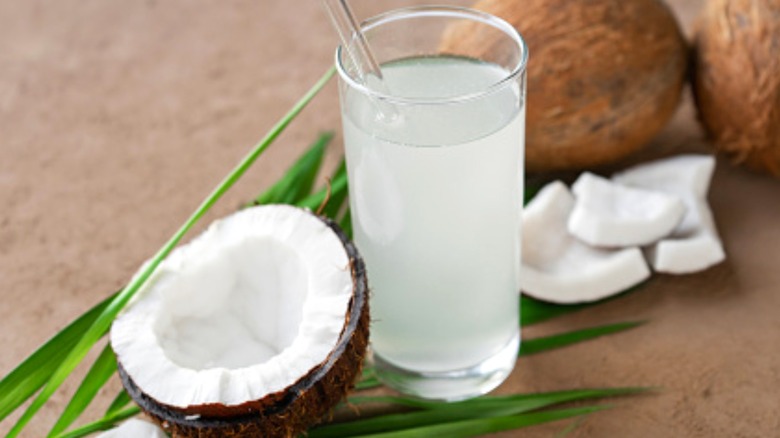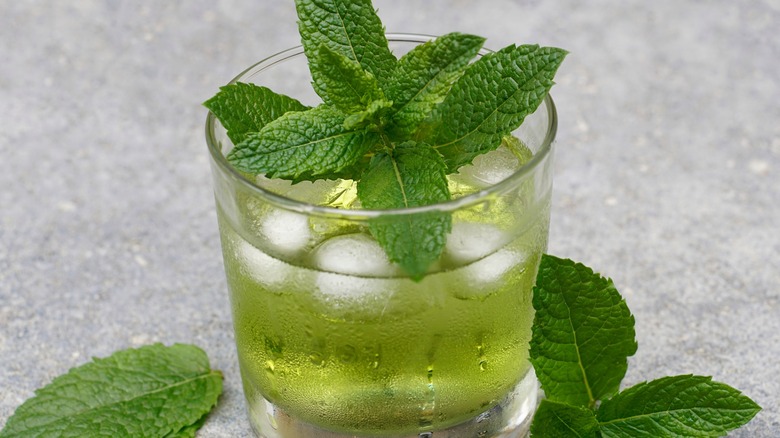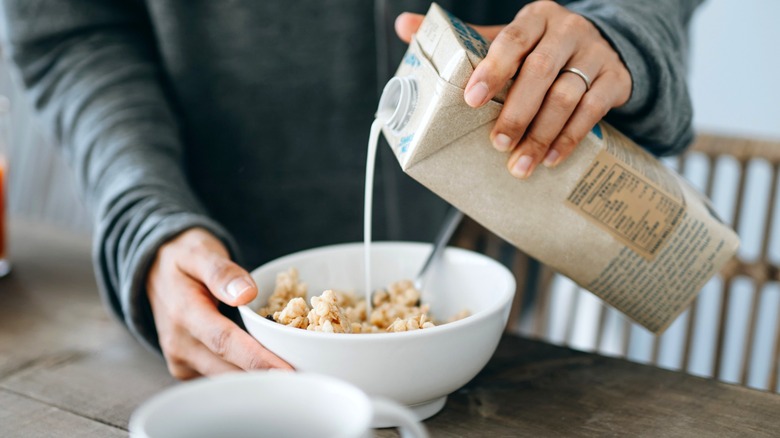The Best Healthy Drink Alternatives To Diet Soda
Diet soda first hit store shelves during the late 1950s, and its popularity blew up in the ensuing years, becoming an $11.2 billion business, per CNN.
Given this ultra-high figure, it's unsurprising that over 50% of adults between the ages of 18 and 29 reported drinking Diet Coke within four weeks, according to 2018 Statista data. Even so, diet soda has sometimes gotten a bad rap, particularly in the 1970s, when results of studies on lab rats found that saccharin, an artificial sweetener commonly found in diet soda, causes cancer.
Nowadays, you are more likely to find the artificial sweetener aspartame in your diet (or "zero-calorie") sodas. Despite some studies suggesting that artificial sweeteners in diet sodas are linked to an increased risk of diabetes and the World Health Organization recently declaring that aspartame possibly causes cancer, many health experts agree that drinking a few cans of diet soda daily is not harmful. Even so, diet sodas are not a healthy drink, and by making them a prominent part of your diet, you are depriving your body of healthier low- or no-calorie drink choices that contain vital vitamins and minerals.
So, if you're looking to wean yourself off diet soda to give your body more of the nutrients it needs but still want to keep your calories in check, consider swapping in one or more of these healthy alternatives.
Seltzer water
To retain the fizz you love but without the chemicals, introducing seltzer water as an alternative to diet soda will provide your body with more hydration while keeping your taste buds happy.
According to Healthline, seltzer water, or carbonated water, is formed when carbonated gas is infused into water and pressurized. The carbon dioxide mixed with the water forms a weak acid that consequently stimulates nerve receptors that trigger the stinging, effervescent sensation that many people find satisfying. Besides providing your body with hydration, seltzer water can also potentially enhance your digestion process. Studies suggest that seltzer water can stimulate key nerves associated with swallowing and thus improve swallowing ability. Moreover, carbonated water can help provide a feeling of fullness after meals. So for those drinking diet soda as a way to lose weight, converting to seltzer water can also help support attaining your weight loss goals. Additionally, consuming seltzer water may help relieve constipation.
A couple of possible drawbacks of consuming seltzer water are the potential impacts on your teeth enamel and bone health, writes registered dietitian nutritionist Rahel Mathews for the Herald-Tribune. However, you would need to drink seltzer water all day to feel these effects, according to studies. Even so, the erosion is minimal and the erosive effects are far less impactful than what can result from regularly drinking diet soda.
If plain seltzer water doesn't do it for you, add your favorite fresh fruit slices, berries, or cucumber, or herbs such as mint, basil, or rosemary to add pizzazz, per Baton Rouge Clinic.
Flavored water
Flavored water can be an excellent alternative to diet soda because of the hydration it provides while also offering a variety of flavors. However, experts advise being on the lookout for artificial sweeteners, sugars, dyes, and colors.
Dr. Anisha Shetty, an Advocate Children's Medical Group pediatrician at Advocate Dreyer, tells Advocate Health that many drinks, including diet soda, are largely composed of water, but how healthy a drink is depends as much on the other ingredients. Most manufacturers sweeten their flavored water with some form of sugar, such as high-fructose corn syrup or cane sugar, or an artificial sweetener, such as sucralose or aspartame. Consequently, despite the benefits of the water component, don't expect flavored waters to provide much nutrition. Artificial sweeteners are safe, but she advises sweetening your drink naturally with natural fruits for a healthier calorie intake.
Even so, not everyone wants to make the extra effort to create their own flavored water. The good news is that there are flavored water brands out there that health experts can get behind. For instance, Healthline experts include Spindrift among their top picks because it is made with real fruit juices and purees. The drink also doesn't include added sugars or dyes. If you're more of a tea person, another top choice is Sound sparkling water, which infuses their water with teas and herbs and is free of sugars and artificial ingredients.
Otherwise, simply adding a splash of your favorite juice to water may just do the trick!
Coconut water
If you're looking to quench your thirst with a sweet-tasting beverage without extra calories, look no further than coconut water. Besides its delightfully sweet and nutty taste, the naturally occurring water within a fresh coconut is packed with nutrients and is a super way to stay hydrated. But what exactly is coconut water?
Dietitian Maxine Smith, RDN, LD, explains to the Cleveland Clinic that coconut water differs from coconut milk, which is also found inside the coconut. Coconut water is a combination of water and grated coconut that creates a fluid within the fruit, forming a drink free of cholesterol and fats and low in sugar and calories. But coconut water has even more going for it than its low calorie count; it also contains electrolytes, essential minerals that have an electric charge when dissolved in fluids, that are necessary for certain body functions. Examples of electrolytes include sodium, calcium, potassium, and magnesium, among others. Consequently, coconut water is a good beverage choice after your exercise routine to replenish key nutrients lost during intense physical activity.
Making sure you have the right levels of these minerals is vital for your health. For example, potassium is believed to be essential in maintaining heart health, registered dietitian Sarah Olszewski, M.S., R.D.N., C.D.N., tells Prevention, as it relaxes blood vessels. Relaxed blood vessels promote better blood flow and regulate blood pressure. Additionally, coconut water contains antioxidants, substances that neutralize free radicals, which are harmful chemicals that can damage cells.
Kombucha
After a few sips, you may fall in love with kombucha and ditch diet soda altogether, which would be good because this complex, fizzy beverage potentially provides numerous health benefits.
Kombucha may be rising in popularity, but it has been around for ages, dating as far back as 220 B.C. (via Nebraska Medicine). Kombucha may support your health due to its inherent probiotics, which form as a result of the tea, yeast, bacteria, and sugar, the components of the drink that work together to keep your gut healthy (per MD Anderson Cancer Center). Probiotics are live microorganisms that keep good bacteria properly balanced to promote your digestive health. Additionally, kombucha contains antioxidants, so consuming moderate amounts can be a great complement to a nutritious diet that contains fruits, vegetables, and whole grains.
If you've never had kombucha before and you have health concerns, talk to your physician about safe ways to add kombucha to your diet. Those who are at high risk for food-borne illnesses or have a weak immune system should avoid kombucha and other foods and beverages containing raw bacteria. For those who are ready to try it, start with small amounts over a few days and take stock of how you feel. If kombucha works for you, between eight and 16 ounces will provide your body with a good amount of probiotics, per Nebraska Medicine.
You can find kombucha beverages in the refrigerated area of many local grocery stores, but if you're feeling inspired, you can also make your own home-brew kombucha.
Herbal tea
If boosting your immune system is a top priority, herbal tea is an ideal beverage choice. Swap in the world's second-most popular beverage for diet soda, and you will be following in the healthy footsteps of countless others who have been sipping on this infused drink for thousands of years.
Many studies back up the benefits of certain teas (via Harvard Health). Green tea, for one, has a number of superpowers. These unfermented leaves are a potential immune system booster, inflammation fighter, and cancer preventer, thanks to polyphenols, a type of antioxidant inherent in green tea. But green tea isn't the only healthy herbal tea option to add to your diet. Looking for something a little spicy? Though more research is needed, ginger tea contains the antioxidant gingerol, known for fending off disease and inflammation. For those interested in boosting their intake of vitamins B3 and B6, ginger in ginger tea also contains small amounts of these essential nutrients, as well as vitamin C, potassium, and iron. A comprehensive review of research covering the impact of ginger on health also supports ginger's ability to treat gastrointestinal issues.
Chamomile tea is more than just a calming drink before bedtime. An herb found in a family of plants called Asteraceae, chamomile contains compounds called phytochemicals that function as antioxidants, which can potentially reduce the risk of heart disease and some cancers, as well as support the immune system. Another option is hibiscus tea, which may have cardiovascular benefits, help lower blood pressure, and may help protect against certain strains of bird flu, per Harvard Health.
Iced peppermint tea
Is all that diet soda giving you funny feelings in your tummy? Set aside your favorite sugar-free cola and sip some yummy iced or hot peppermint tea instead. Naturally sweet and caffeine-free, peppermint is known to aid in digestion, according to Forbes Health. However, this tasty herb has many other health benefits.
Mint has been tantalizing taste buds and providing health benefits for thousands of years, according to the experts at Healthline. Though there is little research specifically surrounding peppermint tea, there are numerous studies that support the many potential health benefits of peppermint extract.
For example, the peppermint you're ingesting while drinking the tea is known to help provide relief for gastrointestinal problems such as bloating, gas, and other issues by relaxing the digestive process and easing discomfort. A 2014 review of nine studies involving 726 participants concluded that peppermint provides significantly more relief for people suffering from irritable bowel syndrome (IBS) compared to a placebo. Moreover, another study revealed that inhaling peppermint oil can greatly reduce nausea in chemotherapy patients. If you have clogged sinuses due to a cold or allergies, the anti-inflammatory, antiviral, and antibacterial qualities of peppermint are also known to have the potential to provide some relief. Healthline also reports that studies have found that the scent of peppermint can also combat mental fatigue. And looking for a better night's sleep? Then drink a cup of peppermint tea before bedtime. Though more research is needed, as a caffeine-free beverage, peppermint tea is known to have the capacity to be a muscle relaxant and may also improve sleep quality for those diagnosed with cancer.
Homemade lemonade
There's nothing like an ice-cold glass of natural lemonade on a hot summer day. This is an ideal drink to substitute for diet soda, especially if you make it at home, where you can manage the sugar content. Drinking lemonade with little or no sugar can do a lot to support your health, between the hydration it offers and the nutrients you get from the lemons.
The team at Healthline explains that lemons are good for you due to their vitamin C and fiber content. Additionally, lemons contain the compounds hesperidin and diosmin. Hesperidin is known to help with blood vessel conditions and varicose veins. Diosmin can help with those conditions and poor circulation in the legs. Additionally, both have the potential to reduce cholesterol. Consuming lemons may also help with weight loss, though more research is needed to confirm this. Some studies also suggest that consuming four ounces of lemon juice daily may help prevent kidney stones in those who have had kidney stones before. Kidney stones are hard mineral deposits that form in the kidneys; the citrus in lemons can help create an environment less conducive to kidney stone formation.
However, despite all the benefits you can get from drinking lemonade, you must be mindful of consuming too much sugar. Making your own lemonade at home can circumvent this issue. Lemons, water, and minimal sugar are all you need to make your own tasty and refreshing version. To make a healthier sweet lemonade, substitute honey, agave nectar, or a splash of fresh fruit juice for regular sugar, per Food Network.
Fresh-squeezed orange juice
If you can safely consume sugar, consider substituting a glass of fresh-squeezed orange juice for one of your daily diet sodas. Orange juice has many amazing health benefits, though experts generally suggest sticking to fresh-squeezed juice compared to juice made from concentrate, as those products may contain added sugars, preservatives, and other artificial additives.
Probably the most notable benefit of drinking fresh-squeezed orange juice is the strong boost of vitamin C. Drinking eight ounces of fresh-squeezed orange juice provides your body with 125 milligrams of vitamin C (via Saber Healthcare Group). The recommended daily amount of vitamin C for women is 90 milligrams and for men 75 milligrams (via Mayo Clinic). Getting enough vitamin C each day helps build strong skin, bones, and tissues due to vitamin C's ability to boost your body's production of collagen, a kind of protein.
Fresh-squeezed orange juice also contains antioxidants, such as hesperidin. Carotenoids, another type of antioxidant found in orange juice, can help support your immune system and potentially fend off diseases and viruses, such as the flu. Additionally, consuming fresh-squeezed orange juice may help prevent kidney stones, as it has the potential to raise your body's pH levels, consequently making your urine more alkaline. pH measures the acidity in your body fluids. Greater alkalinity in urine can combat the formation of kidney stones. Drinking fresh-squeezed orange juice may also support heart health by reducing the bad cholesterol, or LDL cholesterol, along the walls of your arteries. Additionally, consuming fresh-squeezed orange juice has the potential to aid in weight loss as it can help curb your sugar cravings, per Saber Healthcare Group.
Almond milk
Almond milk is so tasty and packed with good-for-you nutrients, it's no wonder it's the second-most popular plant milk in America.
Low in calories and dairy-free, Medical News Today explains that almond milk is made by combining almonds, obviously, and water and straining out the solid components, resulting in a creamy texture similar to regular milk. The pleasant texture, along with almond milk's tasty almond flavor, makes it a popular beverage for those who can't consume dairy or are following a vegan diet. If you decide to try almond milk, just be sure to check the label, as some commercial almond milk could contain added sugar. For instance, an eight-ounce serving of unsweetened almond milk should contain around 40 calories, three grams of fat, and zero sugar (per WebMD).
Besides monitoring sugar content when shopping for almond milk, also compare how brands measure up when it comes to nutrients and fiber, as manufacturers tend to fortify almond milk since it tends to lose antioxidants and other healthful benefits during the straining process.
Almond milk can be a great alternative for those who normally drink diet soda for weight loss purposes, as almond milk is low in calories, despite almonds being high in fat. Manufacturers dilute the fat content with water, making almond milk similar in calories and fat to skim milk. Additionally, enriched almond milk can be a good source of calcium, which helps support bone health and reduce the risk of developing osteoporosis, per Medical News Today.










